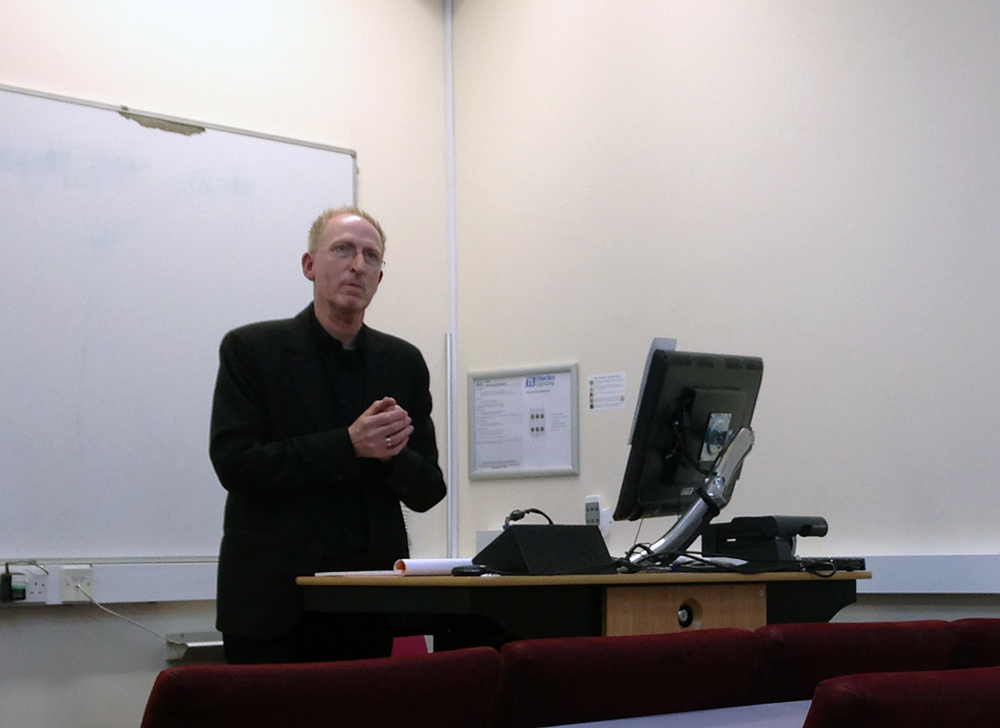[Note: while the events discussed here are extremely controversial and a full explanation certainly exceeds the scope of this blog post, for those interested I highly recommend checking out John’s book, Partitioning Palestine: Legal Fundamentalism in the Palestinian-Israeli Conflict (Pluto Press, 2010), where many issues presented in the recent talk are explained in far greater detail.]
For the student of public international law, few issues are as divisive and emotionally-laden as the ongoing question of Israel-Palestine. However, on Tuesday 29 November Dr John Strawson of the University of East London showed us that nuanced and contextual approaches to this conflict that dignify the experiences of all peoples involved is not only possible, but essential. As a leading expert on Islamic law, legal histories of the Middle East, and the colonial/postcolonial influences in law, John drew upon a vast array of knowledge in showing how the understanding this conflict’s origins can serve as a guide for action in the present day.
In confronting claim that Palestine was never constituted as a state and to recognise it as such would be ‘artificial,’ John reminds us that nearly all postcolonial states could be deemed as such ‘artificial creations’ and this raises the question as to what is ‘natural’ in these contexts. In proceeding from this basis he provides an overview of the League of Nations mandate system whereby the process of ‘civilising’ the former German and Ottoman territories after the First World War included the British-administered Mandate of Palestine (which consists of the modern state of Israel and the occupied Palestinian territories). During this timeframe there where competing visions of the future ranging from incorporation into a united Pan-Arab state to Churchill’s ideal of transformation into a traditional British colony to various Zionist approaches that generally centred on binational statehood.
In accounting for the breakdown in mandatory Palestine in 1947 to 1948, John places these events in the context of the larger crisis of empire occurring at the time. In this timeframe British had just left the violent and chaotic situation that was the partition India. This prompted Britain to turn the entire situation over the newly established United Nations leaving to on of the most humiliating retreats from empire whereby thirty thousand British withdrew from Mandatory Palestine. They left behind no structures of governance and no instructions for civil servants. In was against this backdrop that the fortuitous events including the 1948 War, the declaration of Israeli independence as a Jewish state, and the birth of the Palestinian refugee crisis occurred.
In turning to the present day situation, John recommends a revisitation of the partition plan in United Nations General Assembly Resolution 181. While acknowledging the UN’s ambivalence to the entire situation, even in the immediate aftermath of the Holocaust, this resolution is interesting for several reasons. What it provides for a system of two independent states that nonetheless calls for common institutions of governance and economic management that accounts for the historical unity of the territory. For John, such an approach can allow for the transcendence of the ‘one-state solution’/‘two-state solution’ deadlock by envisioning a project of ‘two states, one homeland.’ However, despite this optimistic prospect, he is clear that such an outcome requires an emancipatory political will that is becoming increasingly scarce in the world today. Here legal reasoning on its own is not enough to create a just and peaceful outcome for Israel/Palestine or anywhere else for that matter. That said, should we desire a better international law, we must first begin with a better international politics.

